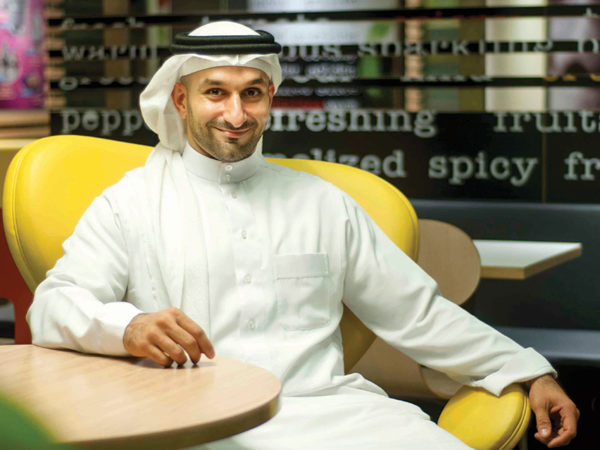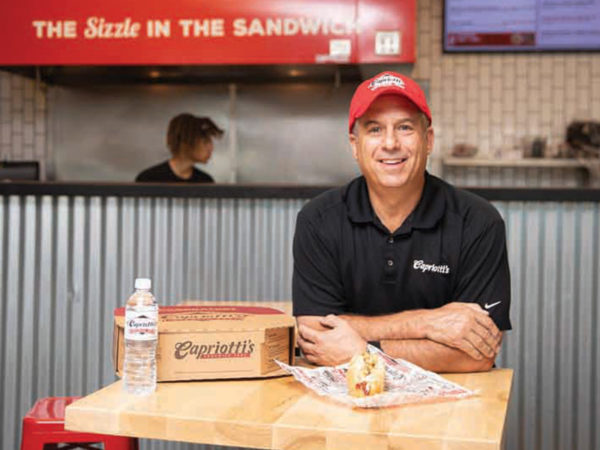Alumni Faces of Franchising

From Big Macs in Bahrain to sandwich shops in Las Vegas to barre classes in Western Massachusetts, Babson alumni are thriving in the world of franchising. Here is a look at just a few alumni who have found success and happiness in franchising:
Stretching Yourself
Like many people, Elizabeth Roberts ’06 reassessed her priorities during the Great Recession. She had enjoyed a successful career with FTI Consulting, advising companies on performance improvement, and with a boutique wealth management firm. After starting a family, she turned the analysis inward: It was time for a change.
Roberts didn’t expect to find it during an exercise date with her husband, Frank Roberts ’04, though. The couple dropped their two kids with grandparents to check out Pure Barre, a popular low-impact, high-intensity workout set to music. A lifelong athlete, she figured the class would be an easy way to decompress and check out a new fitness concept. But, the isometric, 50-minute ballet-style session left her shaking and sweating. She was hooked—and sure of her next move.
READ MORE: Kate Jaspon ’98 Is Driven to Inspire
“From my phone, on the way home, I submitted an application to become a franchisee,” she says.
After a successful interview and a detailed three- to five-year business plan—“Babson’s entrepreneurship classes really prepared me for that,” she says—Roberts was greenlit to open a location in Northampton, Massachusetts, close to her Easthampton home.
“I did a classic Babson move. I bootstrapped it. I used all of my savings and a zero-percent credit card to open my first location,” she says.
The risks weren’t just financial. The franchise agreement required her to teach barre, no small feat because she was expecting a third child. Roberts had played ice hockey, rugby, and softball at Babson, but this was far more intense.
“I taught myself barre in my living room, alone, pregnant,” she recalls. “At one point, I thought: ‘What have you gotten yourself into?’ I was a stick-and-sports girl! It was very hard.”
“You’re still an entrepreneur, but there’s a proven model that you’re implementing. I didn’t invent barre, but I love it. That’s the benefit of a franchise.”
Elizabeth Roberts ’06
Eager to corner the sleepy Western Massachusetts market, she bought another franchise while in the hospital after the birth of her daughter.
Today, Roberts is one of Pure Barre’s most prolific franchisees. She owns 11 locations in Massachusetts and Connecticut, employing roughly 130 women. After her early investment, she has achieved a balance between risk and security with an established brand.
“You’re still an entrepreneur, but there’s a proven model that you’re implementing,” she explains. “I didn’t invent barre, but I love it. That’s the benefit of a franchise.”
Customizing Your Business
Like many teenagers, Abdulla Adel Fakhro ’03, MBA’08 spent his adolescent summers working in fast food. Just one difference: His family owns the Fakhro Group, a force in the Bahraini economy with interests in real estate, insurance, restaurants, and the automotive industry.

Just the same, Fakhro began his career as a 14-year-old at the bottom of the food chain, literally.
“I started with a lot of administrative and clerical stuff, learning the discipline of not sleeping through the afternoon on summer breaks,” he says, laughing.
Now, the fourth-generation family enterprise operates 34 McDonald’s restaurants in Bahrain, dominating the small island nation’s fast-food market. Fakhro oversees those relationships and is orchestrating expansions in the Persian Gulf.
Fakhro credits Babson with preparing him to navigate the dynamics of a sprawling, multigenerational family business with tentacles in various industries.
“You need to be patient and a diplomat. I learned about building relationships, financials, and HR at Babson,” Fakhro says. “My favorite professor was Len Green, who specialized in entrepreneurship for family business. He was a great character. Memorable. And his teaching method was hands-on and practical, with lots of real-life case studies.”
“The nice thing about franchising is you can grow quickly, regionally, globally. With a good franchisor, you end up becoming more or less the same team.”
Abdulla Adel Fakhro ’03, MBA’08
Although he always expected to return to the family fold, Fakhro says franchising makes good business sense for first-time entrepreneurs, too, so long as you find a reputable partner.
“The nice thing about franchising is you can grow quickly, regionally, globally,” he says. “With a good franchisor, you end up becoming more or less the same team. You benefit from each other’s resources.”
It helps if you like the product. His go-to McDonald’s order? “I love Big Macs,” he says. “It’s always been a Big Mac.”
Finding Your Sweet Spot
Jeff Klein ’91 was an entrepreneur ever since he opened his first childhood lemonade stand (he later diversified with lawn mowing). His parents ran a scrapyard demolition business, so the lifestyle seemed attainable—more so once he enrolled at Babson, where he selected classes that would prepare him to take over someday.

But, life took a different turn when his wife, a physician, was recruited to work in Las Vegas. Klein began working in medical device sales and at the same time obtained his mortgage broker’s license. Fortuitously, when a friend needed a home equity line of credit on his house to open a sandwich franchise, Klein ended up going in on the business, too. It was a low-stakes decision that changed his life.
“It just was an investment for me. We just kept growing and kept reinvesting the capital back into more locations,” he says, opening eight stores in two years.
“I think franchising makes business a little easier,” Klein says, noting that he has run his own restaurants without the same infrastructural support. “What I love about the franchise model is it’s basically plug and play: They help you with the real estate, they help you with the construction, they help you with the operations. They want to help you grow.”
Now, Klein owns 15 branches of Capriotti’s Sandwich Shops across two states, plus various Auntie Anne’s and Baskin-Robbins locations, among other food interests, as well as The Gents Place, an upscale men’s grooming salon. He also helps aspiring Babson franchise owners understand the process, and he’s candid about his challenges. For instance, during the pandemic, he invested in a mobile vet business wherein doctors would make house calls. However, it was a fledgling idea and outside his sweet spot.
“I think franchising makes business a little easier. What I love about the franchise model is it’s basically plug and play. … They want to help you grow.”
Jeff Klein ’91
“Fantastic idea, and I even used the service. But, I didn’t know anything about the vets, or how to hire vets, and the franchise was newly emerging,” he says. “They only had a few locations around the country, and they didn’t offer the similar support like Capriotti’s or Baskin-Robbins.”
But, this kind of give-and-take is why entrepreneurship is so exciting—and, hopefully, rewarding.
“People come to Babson with an entrepreneurial spirit, and Babson teaches you that it’s OK to try and it’s OK to fail and that this is how you succeed,” Klein says.
Posted in Community



